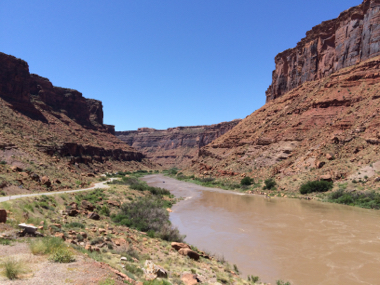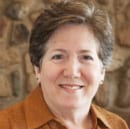CONGRESS ON SUSTAINING WESTERN WATER
December 1-2, 2015
American Geophysical Union
2000 Florida Ave NW
Washington, DC
Water is scarce throughout much of the western United States. West of the 100th meridian, average annual rainfall is less than 20 inches. Regardless, population in western states has increased rapidly and agricultural production is significant in some areas. From 2000 to 2010, the population of the West grew by 13.8%, or 8.7 million people. California's $2.2 trillion economy is the seventh largest in the world; population in this state increased from 15.7 million people in 1960 to 38.8 million today. California agriculture generates roughly $37.5 billion annually, more than any other state.
The population growth and shaping of the West during the later half of the 20th century occurred during an anomalously wet period in the region's history. Analysis of tree rings indicates that western states have experienced many droughts lasting two decades or longer, including two megadroughts that lasted over a century.

According to the U.S. Drought Monitor, 11 of the past 14 years have seen drought in much of the American West, from California to Texas and Oklahoma. The past four years in particular have seen extreme drought in this region with no relief in sight. Sierra Nevada snowpack, critical to California's water supply, is at historic lows - just 6% of the long-term average. The water level in Lake Mead dropped 4 feet from May to June 2015; at 1,075 feet and 37% full, the Lake has not seen these levels since it was created in the 1930s. Finally, between 2004 and 2013, the amount of groundwater within the Colorado River Basin decreased by approximately 49 cubic kilometers, representing 75% of the total water lost for this time period.
In the American West, water is allocated based on a system of prior appropriation. In this system, water-right holders have access to the resource based on seniority, not the quantity used or for what purpose. Cities account for approximately 20% of total water withdrawals; agriculture consumes the remaining 80%. Strategies for coping with drought - including irrigation and water conservation - have a long history in this region. However, it will be a challenge to adapt these strategies and apply them to the severe droughts projected for the future.
RNRF congress delegates assessed the challenges of managing scarce water resources within the economic and regulatory framework of the western states. The congress featured discussion of methods and opportunities to sustain water resources including water transfers, land-use policy tools, and future scenario planning. The importance of conserving water for forests, wildlife and ecosystems were addressed as well.
SPEAKERS

David Cleaves
U.S. Forest Service

Ellen Hanak
Public Policy Institute
of California

Thomas Harter
University of California,
Davis

Carly Jerla
U.S. Bureau of
Reclamation

Kurt Johnson
U.S. Fish and Wildlife Service

Sharon Megdal
University of Arizona

Doug Parker
California Institute for
Water Resources

Adam Schempp
Environmental Law
Institute

Buzz Thompson
Stanford University

Reagan Waskom
Colorado Water Institute
PROGRAM
Tuesday, December 1
8:00 am – 8:50 am
Registration and Continental Breakfast
9:00 am – 9:15 am
Welcome and Opening Remarks
Richard Engberg
Chairman, RNRF Board of Directors
North Bethesda, Maryland
9:15 am – 9:45 am
The Western Water Landscape
An overview of historical water management in the West including water allocation and infrastructure development. Why is water availability an issue today?
Doug Parker is the Director of the California Institute for Water Resources, part of a nationwide network of 54 universities funded by the US Geological Survey under the Water Resources Research Act of 1964. Doug is also the Strategic Initiative Leader for UC Agriculture and Natural Resources’ Water Quality, Quantity, and Security Strategic Initiative. He coordinates water-related research, extension, and education efforts across the 10 UC campuses, the UC ANR system, and other academic institutions within California.
Doug works with federal, state, and local agencies to guide academic expertise toward finding solutions to California’s water challenges. He brings together local, state, and federal stakeholders to identify issues and sources of political and financial support for water-related research. To improve the understanding of water issues, he serves as a key spokesperson on California water issues, working with federal, state, regional, nonprofit, and campus stakeholders on advocacy and outreach programs.
Prior to joining the University of California, Doug worked on water quality issues related to the Chesapeake Bay as an Associate Professor and Extension Specialist in the Department of Agricultural and Resource Economics at the University of Maryland. He has also worked on issues related to California water as an Extension Economist at UC Berkeley. Doug obtained his Ph.D. in agricultural and resource economics at UC Berkeley and bachelor’s degrees in economics and environmental studies at UC Santa Barbara.
Director, California Institute for Water Resources
Strategic Initiative Leader, University of California Agriculture and Natural Resources' Water Quality, Quantity and Security Strategic Initiative
Oakland, California
9:45 am – 10:15 am
Questions and Discussion
10:15 am – 10:30 am
Break
10:30 am – 11:00 am
Federal, State and Constitutional Law Influences on Water Ownership, Management and Regulation in the West
A leading expert in environmental and natural resources law and policy, Barton H. “Buzz” Thompson, Jr. has contributed a large body of scholarship on environmental issues ranging from the future of endangered species and fisheries to the use of economic techniques for regulating the environment. He is the founding director of the Stanford University Law School’s Environmental and Natural Resources Program, Perry L. McCarty Director and senior fellow of the Woods Institute for the Environment, and a senior fellow (by courtesy) at the Freeman Spogli Institute for International Studies. In 2008, the Supreme Court appointed Professor Thompson to serve as the special master in Montana v. Wyoming (137 Original). Professor Thompson is chairman of the board of the Resources Legacy Fund and the Resources Legacy Fund Foundation, a California trustee for The Nature Conservancy, and a board member of both the American Farmland Trust and the Sonoran Institute. He previously served as a member of the Science Advisory Board for the U.S. Environmental Protection Agency.
Before joining the Stanford Law School faculty in 1986, he was a partner at O’Melveny & Myers in Los Angeles and a lecturer at the UCLA School of Law. He was a law clerk to Chief Justice William H. Rehnquist ’52 (BA ’48, MA ’48) of the U.S. Supreme Court and Judge Joseph T. Sneed of the U.S. Court of Appeals for the Ninth Circuit.
Buzz holds a B.A. in economics and political science from Stanford University, an M.B.A. from Stanford Business School, and a J.D. from Stanford Law School.
Robert E. Paradise Professor of Natural Resources Law
Perry L. McCarthy Director, Woods Institute for the Environment
Stanford University
Stanford, California
11:00 am – 11:30 am
Questions and Discussion
11:30 am – 12:30 pm
Lunch
12:30 pm – 3:00 pm
Panel: Pathways to Sustainable Water Use
As we plan for future population growth, water-related infrastructure investments and environmental needs, how are estimates developed to predict how much water will be available for use on a sustainable basis, particularly in light of climate change? How can surface and groundwater be managed in a holistic and sustainable way? What monitoring, data and regulatory mechanisms are required for sustainable water use?
12:30 pm – 1:00 pm
Sustainable Water Use in California
Thomas Harter has a B.S. in hydrology from the University of Freiburg, Germany and a M.S. in hydrology from the University of Stuttgart, Germany. He received his Ph.D. in hydrology (with emphasis on subsurface hydrology) at the University of Arizona. In 1995, he joined the faculty at the Department of Land, Air, and Water Resources, University of California, Davis. His research focuses on nonpoint-source pollution of groundwater, groundwater modeling, groundwater resources evaluation under uncertainty, groundwater-surface water interaction, and on contaminant transport. Thomas's research group has done extensive modeling, laboratory, and field work to evaluate the impacts of agriculture and human activity on groundwater flow and contaminant transport in complex aquifer and soil systems. In 2007, Thomas was appointed Robert M. Hagan Endowed Chair in Water Management and Policy. Also in 2008, Thomas's research and extension program received the Kevin J. Neese Award in recognition of its efforts to engage scientists, regulators, farm advisors, dairy industry representatives, and dairy farmers to better understand the effects of dairy operations on water quality.
Robert M. Hagan Endowed Chair, Water Management and Policy
Cooperative Extension Specialist (Professor), Groundwater Hydrology
Department of Land, Air and Water Resources
University of California, Davis
Davis, California
1:00 pm – 1:20 pm
Questions and Discussion
1:20 pm – 1:50 pm
Sustainable Water Use in the Arid Southwest
Sharon Megdal is Director of The University of Arizona Water Resources Research Center (WRRC) and C.W. and Modene Neely Endowed Professor in the College of Agriculture and Life Sciences. Her work focuses on water resources management and policy, on which she writes and frequently speaks. She also holds the titles Professor, Department Soil, Water, and Environmental Science, and Distinguished Outreach Professor. She serves as Director of the Water Sustainability Program and Co-Director of The University of Arizona Water, Environmental and Energy Solutions Program, both of which are funded by the Technology Research Initiative Fund (TRIF).
Sharon places particular emphasis on how to achieve desired policy objectives in terms of institutional structures and possible changes to them. Current projects include: comparative evaluation of water management, policy, and governance in growing, water-scarce regions; meeting the water needs of the environment; groundwater management and governance; groundwater recharge; and transboundary aquifer assessment. She is the lead editor of the book, Shared Borders, Shared Waters: Israeli-Palestinian and Colorado River Basin Water Challenges. Sharon teaches the multi-disciplinary graduate course Arizona Water Policy. She serves as President of the National Institutes for Water Resources (NIWR) and is a member of the board of the Universities Council on Water Resources (UCOWR) and the Western Rural Development Center. As an elected member of the Central Arizona Water Conservation District Board of Directors, Sharon is responsible for the policies, rates and taxes associated with delivering Colorado River water through the Central Arizona Project. Sharon has served on numerous Arizona boards and commissions, including the Arizona Corporation Commission, the State Transportation Board and the Arizona Medical Board. She holds a Ph.D. degree in economics from Princeton University.
Reagan Waskom currently serves as the Director of the Colorado Water Institute and the Chair of the Colorado State University Water Center. Reagan is a member of the Department of Soil & Crop Sciences at CSU, where he has worked on various water related research and outreach programs for the past 27 years, conducting statewide educational and applied research programs on water quality, water quantity, water policy and natural resource issues related to water use. His current teaching responsibility at CSU is for GRAD592 the Graduate Water Resources Seminar. In addition, he oversees the CSU Extension Water Outreach program and personnel. Reagan's current research emphasis is on the integrated use of surface and groundwater in the S. Platte Basin, the impacts of shale gas development on water resources, and agricultural water conservation in the Colorado River basin. He received his BS and MS degrees from Texas A&M University and his PhD from Colorado State University.
Director, Colorado Water Institute
Chair, Colorado State University Water Center
Colorado State University
Fort Collins, Colorado
2:40 pm – 3:00 pm
Questions and Discussion
3:00 pm – 3:20 pm
Break
3:20 pm – 3:50 pm
Water Transfers
Water transfers enable movement of water to where it is needed. How can water transfer mechanisms be made more effective and useful?
Adam Schempp joined the Environmental Law Institute as a Staff Attorney in 2007. He leads the Institute’s work on water allocation and use in the United States. Much of Adam's research focuses on water resource management, specifically identifying opportunities to meet conservation and sustainability objectives through existing laws and potential legal developments. Adam also has worked extensively on other topics, including TMDLs and CWA 303(d) listing under the Clean Water Act, marine spatial planning and ecosystem-based management of marine resources, and routine program changes under the Coastal Zone Management Act. Prior to joining ELI, Adam clerked in the legal department of the Denver Water Board and for the Native American Rights Fund. He holds a B.A. in ethics, politics and economics with a concentration in environmental policy from Yale University and a J.D. from the University of Virginia.
Senior Attorney and Director, Western Water Program
Environmental Law Institute
Washington, District of Columbia
3:50 pm – 4:20 pm
Questions and Discussion
Wednesday, December 2
8:00 am – 8:50 am
Continental Breakfast
9:00 am – 9:30 am
Land-Use Policy Tools
Can land-use policies and zoning foster sustainable use of freshwater resources by conditioning development upon water availability? Can regional land-use mechanisms be effective?
Ellen Hanak is director of the Public Policy Institute of California (PPIC) Water Policy Center and a senior fellow at the PPIC. Under her leadership, the center has become a critical source of information and guidance for natural resource management in California. She has authored dozens of reports, articles, and books on water policy, including Managing California’s Water. Her research is frequently profiled in the national media, and she participates in briefings, conferences, and interviews throughout the nation and around the world. Her other areas of expertise include climate change and infrastructure finance. Previously, she served as research director at PPIC. Before joining PPIC, she held positions with the French agricultural research system, the President’s Council of Economic Advisers, and the World Bank. She holds a Ph.D. in economics from the University of Maryland.
Senior Fellow and Director, Water Policy Center
Public Policy Institute of California
San Francisco, California
9:30 am – 10:00 am
Questions and Discussion
10:00 am – 10:15 am
Break
10:15 am – 11:55 am
Panel: Drought and Natural Resources Management
What are state and federal agencies doing to adapt management of forests, wildlife and ecosystems to changing climate conditions on federal lands in the West?
10:15 am – 10:45 am
Forests
David Cleaves is the former Climate Change Advisor of the U.S. Forest Service. In this role, he served the Forest Service Chief, executive leadership, and the field by coordinating activities related to climate change adaptation, mitigation, and communication. Dave was the primary spokesperson for the agency on the role of forests in climate change and led the implementation of the Forest Service’s nationwide strategy for weaving climate change response into policies, processes, and partnerships.
Dave was formerly the Associate Deputy Chief of Forest Service Research & Development, the agency's science and technology program. He has also been the director of the Rocky Mountain Research Station and staff director for national research programs in economics, forest products, social science, recreation and tourism, urban forestry, science education, and the Resources Planning Act assessment. Additionally, he led the agency's research and development programs in fire behavior and prediction, fuels management, planning and economics, and human dimensions.
Dave's specialty is decision science and risk analysis. He was formerly the national decision science specialist in the Forest Service where he developed methods and tools for improving environmental analysis and decision processes. Prior to his career in the Forest Service, he was a professor of forest marketing and economics at Oregon State University. Dave has a B.S. and M.S. from Michigan State University and a Ph.D. in economics from Texas A&M University
Former Climate Change Advisor
U.S. Forest Service
Washington, District of Columbia
10:45 am – 11:05 am
Discussion and Questions
11:05 am – 11:35 am
Fish and Wildlife
Kurt A. Johnson, Ph.D., is the National Climate Change Scientist for the US Fish and Wildlife Service (Service), based in Falls Church, Virginia. Kurt provides expertise and consultation services to the Service’s regions and programs on issues related to climate change science, climate vulnerability assessment, and adaptation planning. Kurt is actively involved in the Service’s biological carbon sequestration efforts, including coastal blue carbon. Kurt chaired the Service’s National Climate Team for two years, and prior to that led the team that developed the Service’s Climate Change Strategic Plan. Kurt formerly worked as a listing biologist in the Service’s Endangered Species Program, where, among other issues, he worked on the listing of the polar bear as a threatened species. He obtained his B.S. in Wildlife Science from Utah State University in 1976, his M.S. in Wildlife Ecology from the University of Wisconsin-Madison in 1980, and his Ph.D. in Animal Ecology from Utah State University in 1987.
National Climate Change Scientist
U.S. Fish and Wildlife Service
Arlington, VA
Video
PowerPoint Slides
PowerPoint Notes
11:35 am – 11:55 am
Questions and Discussion
11:55 am – 1:00 pm
Lunch
1:00 pm – 1:30 pm
Future Scenario Planning
How can scenario planning best be used as a tool for implementing sustainable use of freshwater resources? What role does it play in stakeholder engagement and buy-in, as a planning tool, and for public education?
Carly Jerla is an Operations Research Analyst for the Bureau of Reclamation’s Lower Colorado Region in the Boulder Canyon Operations Office. She is currently stationed at the University of Colorado Boulder Center for Advanced Decision Support for Water and Environmental Systems (CADSWES). Carly obtained B.S. degrees in civil and environmental engineering and engineering and public policy from Carnegie Mellon University in 2002. She also earned her M.S. in civil engineering from the University of Colorado in 2005. Carly leads the Region’s research and development of modeling applications and decision support for water operations and planning. She was Reclamation’s Study Manager for the Colorado River Basin Water Supply and Demand Study.
Operations Research Analyst
Study Manager, Colorado River Basin Water Supply and Demand Study
Lower Colorado Region
U.S. Bureau of Reclamation
Boulder, Colorado
1:30 pm – 2:00 pm
Questions and Discussion
2:00 pm - 2:15 pm
Congress Wrap-up and Discussion
Robert Day
RNRF Executive Director
North Bethesda, Maryland
FURTHER READING
Drought in the United States: Causes and Current Understanding. Congressional Research Service. June 2015.
National Drought Forum Summary Report and Priority Actions: Drought and U.S. Preparedness in 2013 and Beyond. National Integrated Drought Information System. December 2012.
Shopping for Water: How the Market Can Mitigate Water Shortages in the American West by Peter W. Culp et al. The Hamilton Project and Stanford Woods Institute for the Environment. October 2014.
Unprecedented 21st century drought risk in the American Southwest and Central Plains by Benjamin I. Cook et al. Published in Science Advances. February 2015.
Water Governance and Climate Change: Drought in California as a Lens on Our Climate Future. Prepared by Jacqueline Peel and Janny Choy, Stanford Woods Institute for the Environment. December 2014.
Water in the West by Andrew Fahlund et al. Published in California Journal of Politics and Policy. 2014.
DELEGATE AFFILIATIONS
American Association for the Advancement of Science
American Forest Foundation
American Geophysical Union
American Geosciences Institute
American Meteorological Society - Policy Program
American Society of Civil Engineers - Coasts, Oceans, Ports and Rivers Institute
American Society of Landscape Architects
American University - Global Environmental Policy
American Water Resources Association
American Water Works Association
American Wind Energy Association
Association of Fish and Wildlife Agencies
Booz Allen Hamilton - Environmental Domain
California Institute for Water Resources
Cleaves Consulting, LLC
College of the Atlantic - Law and Public Policy
Colorado State University - Colorado Water Institute
Congressional Research Service - Resources, Science and Industry Division
CropLife America
DuPont
Environmental Law Institute
Geological Society of America
Georgetown Climate Center - Georgetown Law
International Water Association
Kelly Design Group, LLC
Leidos
National Wildlife Federation
New York Academy of Sciences
Office of U.S Senator Michael Bennet
Office of U.S. Senator Jeffry Flake
Office of U.S. Senator Orrin Hatch
Office of U.S. Senator Harry Reid
Public Policy Institute of California
RAND Corporation
Renewable Natural Resources Foundation
Royal Netherlands Embassy - Office of Science and Technology
Society of Environmental Toxicology and Chemistry
Society of Wood Science and Technology
Soil and Water Conservation Society
Stanford University - Woods Institute for the Environment - Stanford Law
Strategic Conservation Solutions
Swiss Re
Theodore Roosevelt Conservation Partnership - Center for Water Resources
U.S. Agency for International Development
U.S. Bureau of Reclamation
U.S. Environmental Protection Agency
U.S. Fish and Wildlife Service
U.S. Forest Service - Research and Development
University of Arizona - Water Resources Research Center
University of Arizona UMI-iGlobes
University of California, Davis - Water Management and Policy
University of Nevada, Reno - Academy for the Environment
USDA Economic Research Service
USDA National Institute of Food and Agriculture
USDA Natural Resources Conservation Service
USDA Office of Environmental Markets
USDA Office of the Chief Economist
Walton Family Foundation
Washington State University
WateReuse
Yale University - School of Forestry and Environmental Studies
CONGRESS PROGRAM COMMITTEE
Chair:
Richard Engberg, RNRF Chairman; Former Technical Director, American Water Resources Association
Members:
Tom Chase, Alternate Director, RNRF Board of Directors; Director, Coasts, Oceans, Ports & Rivers Institute, American Society of Civil Engineers
Robert Day, RNRF Executive Director
John E. Durrant, RNRF Vice-Chairman; Sr. Managing Director, Engineering & Lifelong Learning, American Society of Civil Engineers
Sarah Gerould, RNRF Board Member; Former Board Member, Society of Environmental Toxicology and Chemistry; Chief of Staff to the Associate Director for Ecosystems, U.S. Geological Survey
Erik Hankin, RNRF Board Member; Program Manager, Student Programs, American Geophysical Union
John W. Hess, RNRF Board Member; President, Geological Society of America Foundation
Paul Higgins, RNRF Board Member; Director, Policy Program, American Meteorological Society
Howard Rosen, RNRF Board Member; Former President, Society of Wood Science and Technology
Nancy C. Somerville, Alternate Director, RNRF Board of Directors; Executive Vice President, American Society of Landscape Architects
Barry Starke, RNRF Board Member; Former President, American Society of Landscape Architects; Principal, Earth Design Associates, Inc.
Kasey White, Alternate Director, RNRF Board of Directors; Director for Geoscience Policy, Geological Society of America
RNRF Staff Liaisons:
Melissa Goodwin, RNRF Program Director
Jennee Kuang, RNRF Research Associate
Special Thanks:
Charley Chesnutt, Coastal Engineer, U.S. Army Corps of Engineers Institute for Water Resources
Taryn Finnessey, Climate Change Risk Management Specialist, Colorado Water Conservation Board
Doug Parker, Director, California Institute for Water Resources
Robert Pietrowsky, Director, U.S. Army Corps of Engineers Institute for Water Resources
Individuals attending Renewable Natural Resources Foundation events may be videotaped, audiotaped or photographed during the course of a meeting. By attending the RNRF Congress on Sustaining Western Water, delegates grant RNRF the right to use your name, photograph, biography, and the content of any comments, if any, in RNRF educational, news, or promotional material, whether in print, electronic or other media, including the RNRF website.
